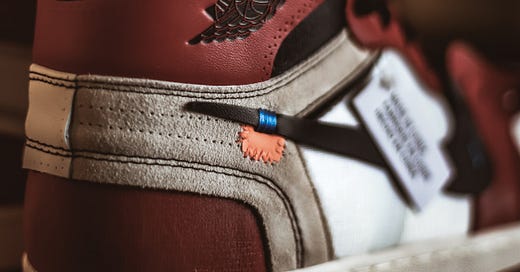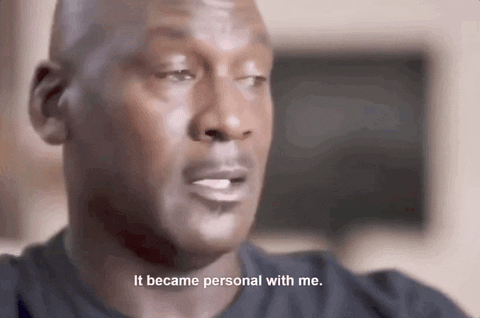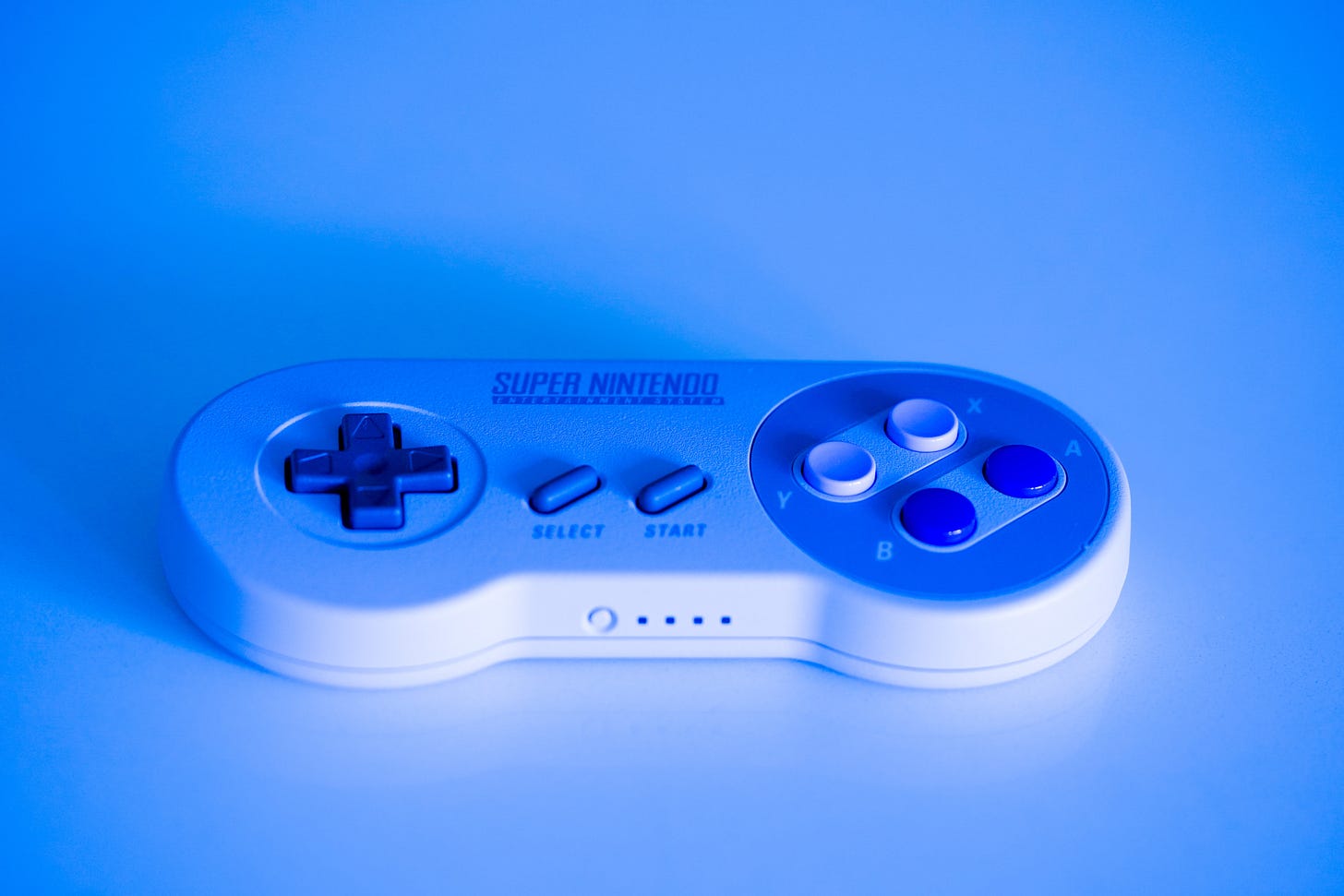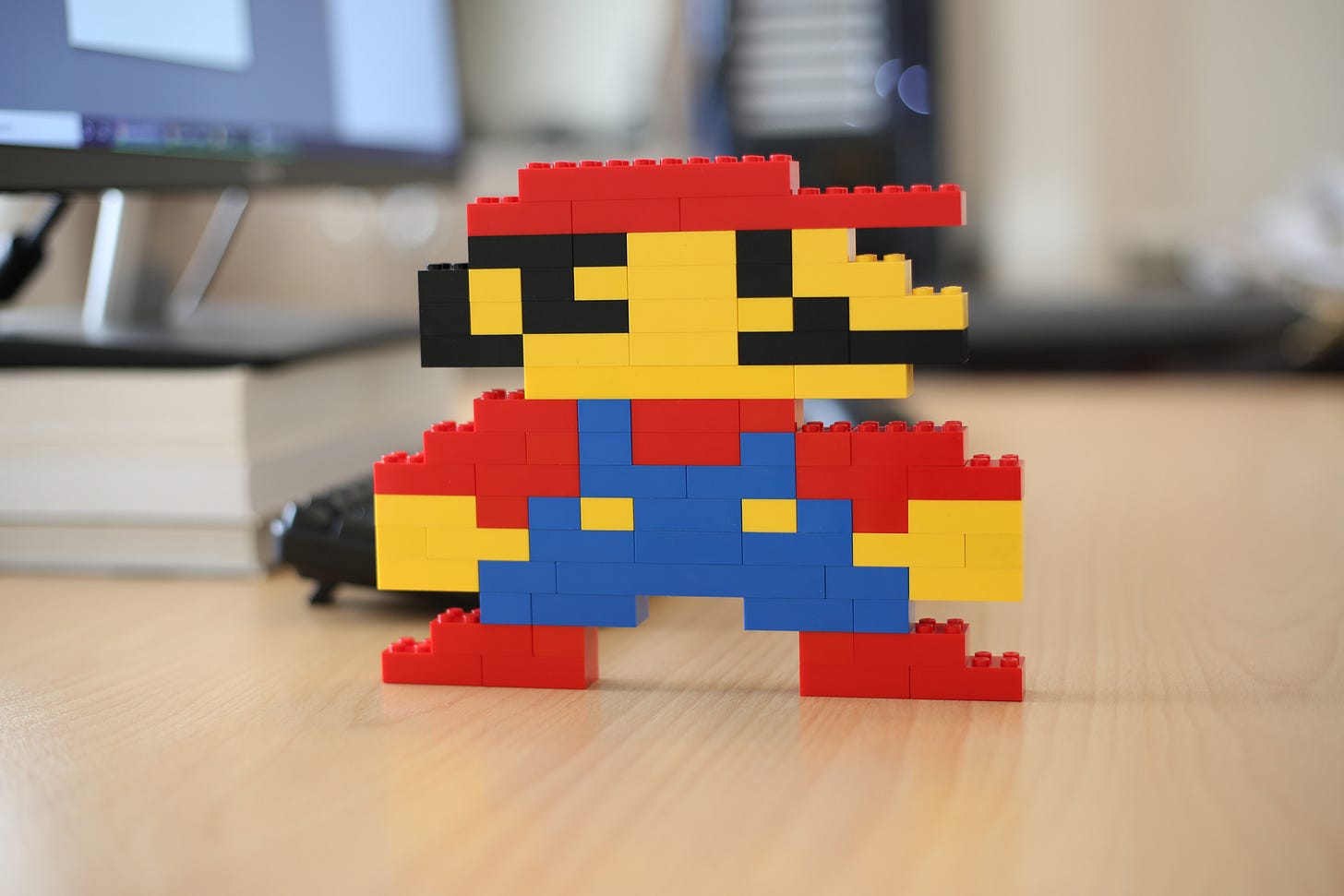Might as well jump (into fun with intellectual property)
From the Air Jordan story to the Super Mario Bros, more and more types of existing IP are being translated into different media contexts. How much can survive the leap?
The dynamic duo
Ben Affleck has played Batman. Matt Damon has never played Robin.
All the same, for three decades, their shared adventures have tracked shifting priorities for the Hollywood A-list, and evolving perceptions of what a movie star is when so many heroes wear capes.
In April, they reunited on screen for the ninth time with Air, which tells the story of how Nike courted a rookie Michael Jordan and created his signature shoe line in the 1980s. Affleck plays Nike founder Phil Knight, and steps behind the camera for only the second time since winning an Academy Award for directing Argo in 2012. Damon, a three-time Oscar nominee as an actor, is generating early awards buzz as Sonny Vaccaro, the executive who brought Jordan in.
The pair last worked together just a couple of years back, on the Ridley Scott drama The Last Duel, but this is their most consequential collaboration for a fair bit longer. Perhaps as much as any entertainers of their generation, they have an origin story that is almost as famous as they are.
To recap: Affleck and Damon, two friends from the Boston suburb of Cambridge, drifted through the 90s getting small parts in Kevin Smith comedies and missing out on the big roles that made other young actors’ careers. So they took matters into their own hands, drafting a script for themselves about a brilliant mind from South Boston who barhops and brawls with his friends – before getting one last chance to make the most of his evident talents.
Good Will Hunting went on to make $226 million worldwide and made Affleck and Damon the youngest-ever winners of the Oscar for Best Original Screenplay. They had written an inciting incident not just for Will Hunting, but for themselves.
A quarter of a century later, deep into Hollywood’s comic book phase, movies like Good Will Hunting are rarer than they used to be. The well-made, grown-up drama is in apparent decline, at least on the big screen. Enter Artists Equity: an ‘artist-led, independently capitalized studio’ co-founded by Affleck, Damon and RedBird Capital’s Gerry Cardinale.
The new venture has twin goals: to ensure creative talent gets a proper share of profits, and to encourage more diverse and original movie ideas.
But there is a knowing irony in the fact that its Amazon-backed opening project is itself rooted in – with apologies – a slam-dunk bit of existing IP. Air is based in part on Phil Knight’s memoir, the sports industry fave Shoe Dog, and leans into the iconography of the trainers themselves. And it is unlikely to have existed without a certain recent piece of documentary filmmaking.
The young Jordan barely features in Air at all – even though the man himself was involved to the point of hand-picking Viola Davis to play his mother, Deloris. Affleck has said that choice was made because of the way the real-life Jordan hangs over the project. It is hard to escape the sense, at least in the public consciousness, that the film is in conversation with The Last Dance.
Falling blocks
By a rough count, Air is the third cinematic paean to the unique power of Air Jordans, after the 2002 Lil’ Bow Wow vehicle Like Mike and, you know, Space Jam. It is also part of a more recent, more pervasive and potentially further-reaching trend.
2023 is the year of the brand movie. Just a few days before Air was released, Tetris landed on Apple TV+. It stars Taron Egerton as Henk Rogers, a videogame mover and shaker who wants to bring an underground puzzle game sensation to Nintendo’s upcoming Game Boy. To do that, he must travel to an end-of-days Soviet Union, win the trust of developer Alexey Pajitnov, and extract the handheld licensing rights from the state-run Elorg. Lurking in the background is the colossal figure of Robert Maxwell, whose Mirrorsoft company is closing in on a deal.
The central story of Tetris has long encapsulated a post-Cold War optimism that feels a little quaint in 2023 but, nonetheless, another soft signal is clearly perceptible. This is a story about the value of ideas and the importance of rewarding creativity, and it is reinforcing a message about Apple itself.
Audiences will be getting used to this over the next few months. Blackberry traces the rise and fall of Research in Motion, the original smartphone pioneer. Flamin’ Hot is the tale of the Frito-Lay janitor who claimed to have invented the Cheetos flavour of the same name. Jerry Seinfeld has co-written and directed Unfrosted: The Pop Tart Story, coming soon to Netflix.
Some of these, like Blackberry, follow the tradition of corporate-sceptic films like the Social Network and The Founder. Others are turning the brand backstory into a parallel of the music biopic, working familiar beats into a pleasing rhythm and smoothing out discordant noise. Only instead of weaving memorable lyrics into their screenplays, these films prime the triggers of business innovation.
Your excitement levels may vary at that thought.
There are a few reasons why this may be happening but a fragmented media ecosystem is a recurrent cause. Well-known IP has been a film and TV industry crutch for years and the flurry of remakes, reboots and sequels has long since thickened to a blizzard. Nostalgia and recognisability offer a reliable impact, albeit with the risk of diminishing returns.
And alongside a fragmentation of media experiences has come a globalisation of consumer choice. For better or worse, certain brands provide as much of an impression of a shared cultural history as, well, culture. Some will not want you to forget it.
Taking the leap
There’s also an animated movie out right now based on a popular video game. You might have heard about it.
As of Sunday 23rd April, The Super Mario Bros Movie had made $878 million at the global box office in its first three weeks on release. Still to open in markets including Japan and South Korea, it is well set to overhaul Frozen 2 as the most successful animated movie of all time.
It is a monumental success for Illumination Studios, which is currently part of plans to reanimate the multibillion-dollar Shrek franchise. But it represents even bigger vindication, and a generational opportunity, for Mario creator Nintendo.
The Super Mario Bros have appeared on screen before. Their 1993 live action debut was a notorious critical and commercial Bob-omb – a litany of very weird choices, very badly executed. The usually conservative Nintendo put a lot of trust in the studio, perhaps driven by a desire to protect an American flank threatened by Sega and its Gen X-centric marketing. That trust was not repaid.
What is most striking about the fiasco at this distance is how it marks out the media hierarchy of the time. The tone and premise of the best-known, most lucrative videogame ever created was entirely secondary to Hollywood whims. That dismissiveness is neatly summed up in the journey of the movie’s soundtrack.
Almost Unreal by Roxette had the chorus: ‘I love how you do that hocus pocus to me’. It’s a mystifying line, until you learn that the song was actually written for the fantasy comedy Hocus Pocus, before Disney requested a switch.
The whole Super Mario Bros experience was chastening for Nintendo, which mostly retreated from experiments in TV shows and novelty pop into its own walled garden for close to 30 years. More recently, it has renewed its interest in diversifying its presence through theme parks and other media. But it was sure to revise its approach to the new Mario movie, marshalling a much safer, more faithful and family friendly adaptation all the way into cinemas.
Its enormous success, coupled with the adoring critical reception for stuff like HBO’s The Last of Us, has fuelled predictions that videogame franchises will dominate the 2020s in movies and TV as comic books have the last 15 years. Still, as it so often does, Nintendo will no doubt find its own path.
The Mario universe is rich in characters and settings, and more sequels and spin-offs are inevitable. Yet in truth, of course, the Mario story is endearingly thin; Mario’s hat and moustache are the result of early processing limitations, rather than intentional design. The whole purpose of his world is play.
In 2019, Nintendo released Super Mario Maker 2 for its Nintendo Switch console. Players could deploy simple, powerful tools to build their own levels in a range of historic Mario games, or play through the creations of other users online. If AI has a future in videogame development, maybe this will be something like Nintendo’s vision for it. An endlessly shifting landscape; a stocky little plumber with yet another day to save.
Something, anywhere, whenever desired
The more diffuse media and commerce become, the more organisations are trying to build identities that hold at the centre.
In April, while delivering the MIP TV Media Mastermind keynote in Cannes, the entertainment producer, investor and commentator Evan Shapiro gave a treatise on the growing importance of malleable ideas.
“You have to think about how to reach the consumer with each piece of IP on different platforms,” added Shapiro, as he unveiled his latest Media Map showing how the major players fit within the current state of the industry.
“Don’t only think about binary traditions. Streaming, linear and social are all combining on a day-to-day basis and we are entering a new era.”
It’s a grand vision, for sure, and a very difficult one for all but the absolute biggest content businesses in the world to get their heads around, never mind their arms. For starters, it could be a matter of breaking activities down into their relationships with one another, and asking how an audience can fit the pieces together.
What will Brad Pitt’s imminent Formula 1 film mean not just to motorsport fans, but fans of Drive to Survive? Is Lego a media platform now? What will the AFC Wrexham story become for Disney if that club climbs the English Football League to find even greater global exposure?
What can be risked in the leap between spaces? What can be gained?
Eoin Connolly is a sports industry writer, editor and presenter. He is also the editorial director at Trippant.







